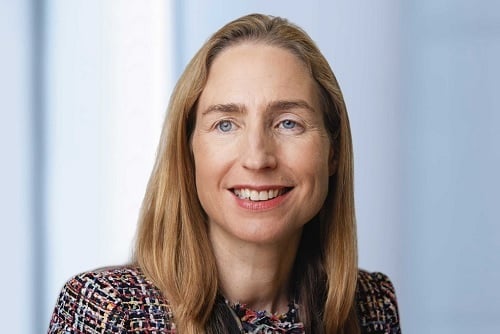

Before she took the reins as Zurich’s group chief risk officer in September 2017, Alison Martin’s resumé didn’t contain any risk management roles. Following her law studies, she fell in love with insurance while working in insurance audit and consulting at PwC. From there she moved to Swiss Re, where she dipped a toe in almost every pool of the business, quickly learning about underwriting, pricing, costing, reserving, RND and claims, before ascending to the role of chief financial officer. So when she took on the role of chief risk officer at Zurich, she was confident that the lessons she’d learned from previous roles and the risks she’d taken had adequately prepared her for the job.
“To me, I have taken risk on the first line all the time,” she says. “What I have done throughout my career is take risk. That means you manage risk – you have to have risk awareness, you have to understand the kinds of risks that exist, what could be your downside as well as your upside, you need to think about what your mitigating actions are. So now, on the second line, I can use all the knowledge I’ve had of taking risk to really try and help the risk team here at Zurich to think about how we can help the first-line team to do appropriate risk-taking as efficiently and effectively as possible.”
Drawn to Zurich by the opportunity to try something new, Martin also passionately believed in the vision Mario Greco was setting out for the company.
“I really believe in the transformation of the insurance industry and how Mario speaks about that – and, more importantly, the actions that he has put in place to have Zurich very well positioned in that transformation,” she says.
She explains that Zurich wants customers to not simply pay a premium and never think about their insurance again. The company wants to move to a model where instead of being an annoying burden, insurance is a value-add service customers enjoy having as part of their lives - and the company is putting actions in place to make this happen.
Growing global risks As group chief risk officer, Martin has also been instrumental in the World Economic Forum’s most
recent Global Risk Report, which Zurich helped to produce in partnership with Marsh & McLennan. The report’s findings on climate change, cybersecurity and geopolitical tension made headlines around the world as the World Economic Forum called for action from governments and business.
“It should be seen as a great wake-up call to government, to companies, to society at large as to what the risks are we face in society generally, and to business specifically,” Martin says.
Not surprisingly, extreme weather events were the number-one risk highlighted by the report in terms of likelihood. For insurers, many of whom are seeing increases in these events and therefore a surge in claims in the aftermath, the report presents a number of thought-provoking issues – some of which they might want to tackle by leading by example.
Zurich has taken steps in the environmental space, for example, by choosing to not insure coal plants or invest in companies that derive more than 50% of their revenue from coal. And Martin is very firm on her position on the matter of climate change.
“Particularly worrying for me is that number two now is the failure of climate change mitigation and adaption – i.e. failure of policy to do anything about the risk – and extreme weather events is number one,” she says. “As an insurer those two things are a little worrying.”
The other major area insurers must keep an eye on, Martin says, is cyber risk. Although it seems very different than environmental risk at first glance, Martin believes the two are actually very similar in a lot of ways.
“What makes cyber and environmental risk similar is the fact neither of them have boundaries, neither of them have borders,” she says. “And that makes them very tricky to deal with. Cyber is one of those accumulation risks. It’s a constantly evolving and emerging risk, and we see an unfortunate lack of awareness.”
Championing diversity
One of Martin’s other passions is raising awareness of the diversity, the lack of which continues to haunt the industry.
“The insurance industry is probably no poster child for diversity, but Zurich I think is a good poster child,” she says. “We’re not perfect, but if you look at the changes that Mario has made over the last couple of years alone, he has radically shifted the executive committee’s composition, so we have much better gender diversity.”
These changes, she says, can help to shift the culture in an organization and send strong signals of support. Martin is also part of Zurich’s women’s innovation network, and she works hard to ensure she helps other women in the firm.
“I take the role model part of the position very seriously,” she says. “I think it’s very important that, if you have that ability to influence others coming through their career, you take that opportunity. I think
that sends a really strong signal to the whole organization, but more importantly to the industry at large, that you can be successful – and in fact you are more likely to be very successful – if you have diversity.”
